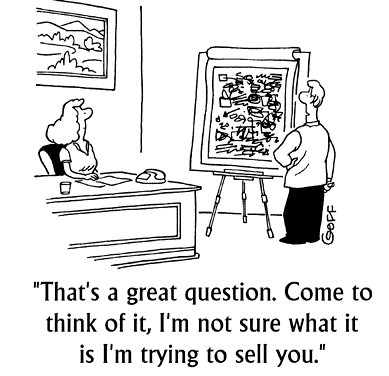Before You Can Market Something, You Need to Know What You’re Marketing
I was talking with an internet consultant contact of mine the other day – chatting about how he helps businesses with their online client acquisition strategies. In the midst of our conversation he said something very interesting – something that resonated with my own experience:
‘Before I even get into the online strategy I spend a lot of time working with clients identifying what they actually sell. You’ll be surprised how many don’t know…’
Now clearly you’ll be assuming that this guy must work entirely with morons. How on earth can they not know what they’re selling?
Well of course they know what they’re selling – at least on a functional level – in our case, holidays, airline seats, hotel rooms, destinations etc. But they don’t understand what they’re really selling – what their unique proposition to the market is. Why people are buying from them. That’s where people like me and him come in.
Let’s take holidays or weekend breaks – as that’s the market we’re in. One thing consumers have these days is a wealth of choice – of places to go, hotels to stay in, airlines to fly, or people to organise it through. So why should they choose your destination, hotel, airline or tour operator? What makes you unique?
If you can’t sum answer that question in a succinct sentence or 2, you’re in trouble because if you can’t do it, you can bet your potential customers can’t do it either.
Let’s take an example – SouthWest Airlines in the US, the airline that Michael O’Leary’s Ryanair is modelled on. Their proposition? The low cost airline.
OK, that doesn’t seem so profound. It doesn’t need to be, it just needs to be directional for everyone that works there. The (as in the one and only, the lowest cost) low cost airline as a proposition tells staff in no uncertain terms that costs must be stripped out wherever possible. Everything must be done for less than other airlines pay.
Ever wonder why Michael O’Leary keeps coming out with outrageous pronouncements about what they’re going to charge for next – toilets, fat people etc? Well, first of all, the press laps it up and it’s good for PR. Secondly, he’s sending a signal to the travelling public and his staff that he’ll leave no stone unturned to make the basic ticket cheaper. If that means charging people for toilet trips and love handles so the normal cast-iron bladdered and svelte travelling public can fly for less, then so be it. Both Ryanair and Southwest Airlines are relentless in living and communicating their propositions – we might not like them, but we expect them to be the cheapest (even when sometimes they’re not.)
for next – toilets, fat people etc? Well, first of all, the press laps it up and it’s good for PR. Secondly, he’s sending a signal to the travelling public and his staff that he’ll leave no stone unturned to make the basic ticket cheaper. If that means charging people for toilet trips and love handles so the normal cast-iron bladdered and svelte travelling public can fly for less, then so be it. Both Ryanair and Southwest Airlines are relentless in living and communicating their propositions – we might not like them, but we expect them to be the cheapest (even when sometimes they’re not.)
I should explain that a proposition isn’t a strapline – you don’t have to use it in your advertising (although you can if you want to). It’s succinct way of summing up what makes your organisation or place unique. But if you company lives it, and communicates it, then customers will see and experience something consistent. They’ll understand what you’re about and they can make an informed decision as to whether they want to buy into that concept. If they don’t know what you’re about, they’re not going to value what you sell.
Your proposition might be based on a functional benefit, like costs, or an emotional one, like fun, romance or security. Perhaps your company knows it’s destination like nobody else does, is the leading specialist in a certain type of travel, is the best place to pursue a particular activity or has staff that are obsessed with great service. Or a unique combination of those things.
Whatever your proposition is, it needs to:
• Differentiating, a reason people would choose you and nobody else,
• Appealing to enough people to meet your business objectives,
• Actionable, so your team can live it and communicate it and
• Credible, because otherwise you’ll get rumbled and in the social media age, you’ll probably get rumbled in a very public way
And if you’re racking your brains and you really can’t think what it is – and plenty of organisations, including big ones, spend time wrestling with this dilemma – you can come and talk to someone like me.
